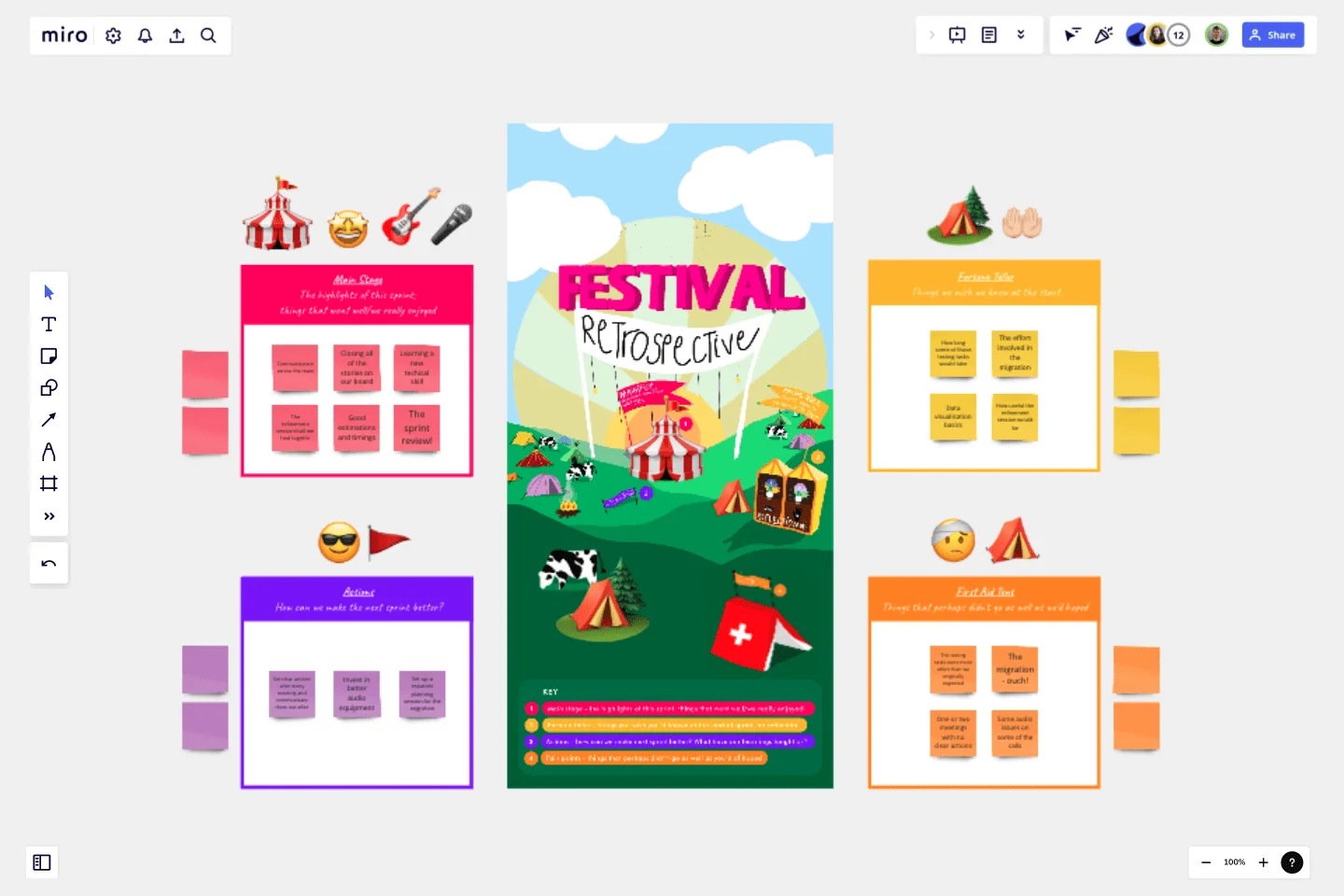Festival Retrospective
The festival themed retrospective has been designed using the metaphors and common areas of a festival for teams to share ideas and key themes
The retrospective is broken up into four main areas:
The Main Stage - highlights of the sprint/iteration; things that went well and that the team enjoyed
Fortune Teller - things we wish we knew at the start
First Aid Tent - pain points; things that perhaps didn't go as well as we'd have hoped
Actions - how can we make the next sprint/iteration better?
Use the blank post-it templates available and some of the example post-its as a starter and work your way around the board from Main Stage, to Fortune Teller, to the First Aid Tent, where the pain points identified by the team help to drive conversation and insight into the final Actions section.
Enjoy!
Credit for the creative and design to some of the fantastic designers working at Dyson.
Discover how Miro's retro tool can help you run more engaging and inclusive retrospective sessions.
Get started with this template right now.
Retrospective - Christmas Edition
Works best for:
Agile Methodology, Retrospectives, Meetings
The Retrospective Christmas Edition template offers a festive and themed approach to retrospectives, perfect for the holiday season. It provides elements for reflecting on the year's achievements, sharing gratitude, and setting intentions for the upcoming year. This template enables teams to celebrate successes, foster camaraderie, and align on goals amidst the holiday spirit. By promoting a joyful and reflective atmosphere, the Retrospective - Christmas Edition empowers teams to strengthen relationships, recharge spirits, and start the new year with renewed energy and focus effectively.
Lesson Reflection Template
Works best for:
Education, Meetings
The Lesson Reflection template is a tool to create space for self-reflection and improvement. Students can evaluate the key takeaways from a lesson and what are the topics they find most interesting. As teachers receive the student’s Lesson Reflection, they can look for opportunities to improve learning and teaching methodologies. The Lesson Reflection template can help you facilitate the educational process, and it’s easy to use and straightforward.
Christmas Retrospective
Works best for:
Agile Methodology, Meetings, Retrospectives
The Christmas Retrospective template offers a festive and celebratory approach to retrospectives, incorporating the holiday spirit into the session. It provides elements for reflecting on achievements, sharing gratitude, and setting intentions for the future. This template fosters a sense of warmth, togetherness, and appreciation among team members, encouraging reflection on both professional and personal growth. By infusing the retrospective with the joy of the holiday season, the Christmas Retrospective empowers teams to strengthen relationships, cultivate positivity, and drive continuous improvement effectively.
Product Monetization Canvas
Works best for:
Product Management, Planning
The Product Monetization Canvas template assists product managers in developing effective monetization strategies. By mapping out revenue streams, pricing models, and value propositions, this template helps align product features with revenue generation opportunities. With sections for analyzing market demand and competitive pricing, it enables teams to optimize monetization strategies and maximize profitability. This template serves as a strategic guide for identifying and capitalizing on revenue opportunities throughout the product lifecycle.
Rose, Bud, Thorn Template
Works best for:
Retros, Agile
The Rose, Bud, Thorn template is a structured method for team reflection and feedback, designed to help teams identify positive aspects, potential opportunities, and challenges within a project or situation. One key benefit of using this template is its ability to promote balanced feedback and productive discussions, which can lead to improved team processes and outcomes.
Start, Stop, Continue Template
Works best for:
Retrospectives, Meetings, Workshops
Giving and receiving feedback can be challenging and intimidating. It’s hard to look back over a quarter or even a week and parse a set of decisions into “positive” and “negative.” The Start Stop Continue framework was created to make it easier to reflect on your team’s recent experiences. The Start Stop Continue template encourages teams to look at specific actions they should start doing, stop doing, and continue doing. Together, collaborators agree on the most important steps to be more productive and successful.
